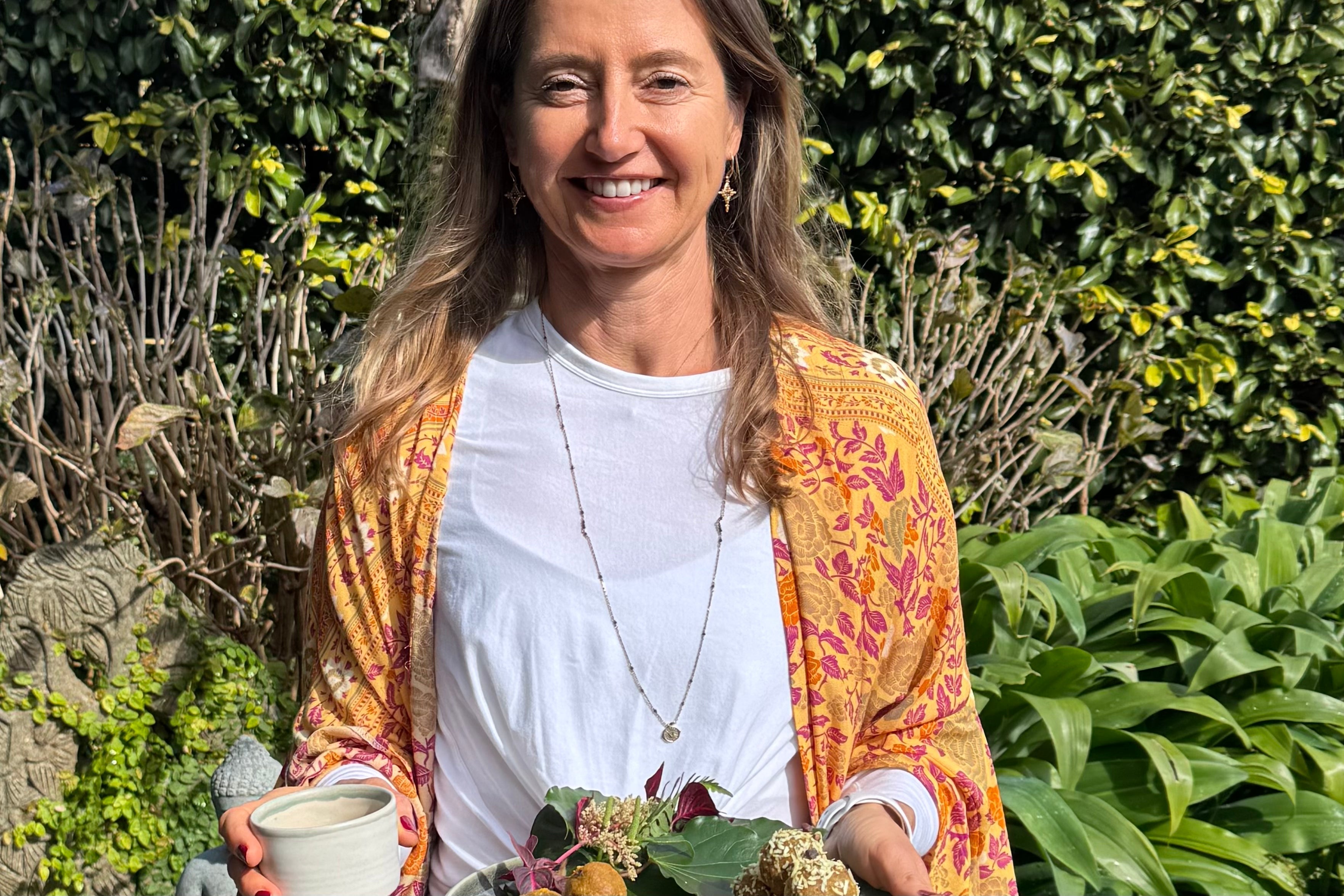An ancient healing system from India, Ayurveda supports your modern lifestyle with a holistic approach which combines diet, lifestyle, herbal medicine and Yoga therapy to restore balance, energy, and quality of life.
Ayurvedic wisdom encourages us all to take responsibility for our own health in alignment with different stages of life, the seasons, and our environment. Ayurveda acknowledges the unique nature of each person through individual constitutions (Doshas) and applies dietary and lifestyle adjustments, body therapies, and herbal remedies to assist in this transformational process.
Tridosha of Ayurveda
All life is created of the five elements: ether, air, fire, water, and earth. Ayurvedic science further organises the elements into three constitutional types known as Doshas.
VATA (Ether = Air) - PITTA (Fire = Water) - KAPHA (Water = Earth)
We each have a specific ratio of the Doshas within us, as part of our constitution. This is known as Prakruti - our unique blue-print created at birth.
When our lifestyle, diet, and environmental factors do not serve us, one or more of the Doshas can get out of balance, weakening our health and sometimes triggering disease. An imbalance of the Doshas is known as Vikruti. To correct aggravated Doshas and recreate a harmonious equilibrium, Ayurveda uses specific diet, lifestyle and cleansing regimes as well as Ayurvedic herbs.
How Ayurveda can help create balance
By understanding the role of the three vital forces in nature and within ourselves, we can use the practical tools offered by Ayurveda to maintain harmony in our daily lives - and enjoy a healthy and balanced body, mind, and consciousness.
Ayurveda uses herbal medicine, nutrition, lifestyle principles, self-care practices, and treatments to assist the Doshas in returning to balance.
The Ayurvedic Sattva Botanicals™ Ayurvedic Herbal Range is created here in Aotearoa by Ayurveda New Zealand to help you to achieve optimum health. All Sattva Botanicals™ ingredients are certified organic and sourced directly from specialist growers in India. Our Ayurvedic range includes products designed specifically to support balance in your Doshas. Feel free to ask for advice on which Sattva Botanicals products will support you best.
Book an Ayurveda Consultation & learn about your Doshas

To discover your Prakruti and reveal any Vikruti so you can create an ayurvedic lifestyle that suits your Doshic constitution, you can book an Ayurvedic consultation with Sarita, founder of Ayurveda New Zealand, and a diploma certified Ayurveda practitioner and Yoga therapist with 15 years' experience. Sarita provides Ayurvedic consultations, treatments and Yoga therapy, and in particular works with clients on stress management, mental health and managing chronic illnesses related to lifestyle and diet.
It's easy to book your first Ayurvedic consultation now, and get advice on your Doshas.
Use our simple Dosha quiz now
For an initial self-assessment of your predominant Dosha, you can use the general descriptions below, and take our online quiz.
Please bear in mind that we are all individuals and although these may give you a basic indication of your main characteristics and tendencies according to Ayurveda, this is not designed as a self-diagnosis tool, or to provide an accurate recommendation for any herbal medication.
Vata
VATA DOSHA governs movement. In the body, this manifests as nerve impulse, the flow of breath in and out of the lungs, and the passage of food through our digestive tract. A person with typical Vata qualities can be described as tall and slim with a light body frame. The skin is usually dry, rough and cold, the hair brittle and dry. The metabolism of a Vata person can be variable and sleep may be light and easily interrupted. Elimination has a tendency to be irregular, dry and hard.
A Vata person is usually very creative, enthusiastic and and has an excitable nature. Art, music and creating things is part of their nature. Physically fast and active, a Vata person likes to do lots of different activities but can get exhausted quickly. Extremities are often cold and the pulse rather irregular and weak. When emotionally out of balance, a Vata person can get hypersensitive, anxious and insecure. Changeable moods and a nervous temperament are typical for Vata people. The dominant and most sensitive areas of Vata are the nervous system and mind. Vata people are usually quick to grasp new information and have a good short-term memory but also forget easily and their long-term memory is rather poor. Weather changes with lots of wind, cold temperatures, travel, alcohol, interrupted sleep and stress can bring Vata easily out of balance.
Typical symptoms of an unbalanced Vata are restlessness, lack of concentration, fluctuating energy, fatigue, exhaustion, agitated nervous system, dryness, IBS, constipation, and unfocused communication.
Pitta
PITTA DOSHA governs transformation. This covers all metabolic processes in the body such as breaking down food for absorption and assimilation by our cells, as well as absorbing visual impressions and turning them into thoughts.
A typical Pitta person is medium build with soft, oily and warm skin, good circulation and warm extremities. Pitta people have medium strength and endurance, a sharp intellect and precise articulate speech. Their comprehension and perception are extremely high and they like competitive challenges and debates. Pitta people are usually very knowledgeable in their field and natural leaders. They require a job in a cooling atmosphere to avoid physical and mental overheating. Their metabolism is fast and they often experience sharp hunger and thirst. Skipping a meal is rather challenging and can lead to ‘hanger’. Elimination is usually regular, soft and loose. Pitta people are physically strong with good endurance. Extremities are usually warm and their emotional temperament is purposeful and driven. When emotionally out of balance Pitta people can become irritable, aggressive and jealous. Most sensitive areas are the skin and digestive system.
An increased Pitta can manifest as inflammation, hypersensitivity, allergies, ulcers, skin irritations and vision problems.
Kapha
KAPHA DOSHA covers structure and stability. Bone, muscles, fat and water in our body are part of this Dosha. A typical Kapha person has a solid, strong and robust body frame, and enjoys great physical strength and endurance. However they need motivation to get moving. Their skin can be described as oily, cool and pale, hair as thick and oily. Kapha people are usually blessed with steady energy, good immunity and vitality. Their personality is relaxed, tranquil, calm and content, their movements slow and graceful. Kapha people are slow to grasp information but have a great long-term memory. Sleep is usually sound, heavy and prolonged. Kapha people tend to have a slow metabolism, mild hunger and a tendency to gain weight. Their elimination is regular and oily. By nature they are very affectionate, tolerant, caring and forgiving. They love spending time with family and friends and cooking is often their passion. When emotionally out of balance, Kapha people can be clingy, attached and sad.
An increased Kapha can lead to congestion, swelling, lethargy, depression and respiratory conditions such as sinusitis and allergies. Low appetite, obesity, diabetes and heart problems are other signs of an elevated Kapha.








Share:
Panchakarma - Ayurveda’s traditional cleansing therapy
Ponsonby News Column December 2023: Ayurveda - The Art of Living Well